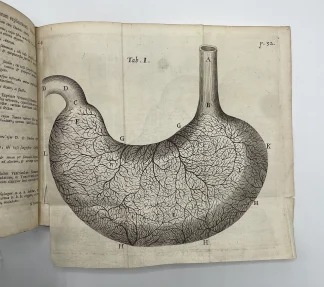WILLIS, Thomas.
‘ONE OF THE GREAT BOOKS OF C17 ENGLISH MEDICINE’
Pharmaceutice rationalis.
[Oxford], E Theatro Sheldoniano [prostat apud Robertum Scott], 1674£1,250.00
12mo. pp. [28], 238, [6]. 3 engraved folding ll. of plates, each comprising 2 numbered engravings of human organs printed on recto and verso. Minimal age yellowing, small tear (flaw) to outer bank margin of C4, minor ink splash along lower edge of last few ll. A very good, clean copy in contemporary sprinkled calf, spine gilt, small loss at head and foot, joints a little cracked at head. c.1700 engraved bookplate of Hieronymus Raussin, professor at Reims, and his ms note (‘Baumani, formularij mat. medicale de pag. 136 2 vol. 3ll’) to front pastedown, early C18 ‘Ex Dono D. Raussin profess. Anton.’ to fly, c.1700 ms ‘2 vol. 3ll’ and ‘N.1216’ at head of title.
A very good, clean copy of the first part of ‘one of the great books of C17 English medicine’ (Heirs of Hippocrates). Thomas Willis (1621-75), a founding member of the Royal Society and physician to Charles I, worked as a physician in Oxford all his life. He made ground-breaking observations on the anatomy of the brain (e.g., ‘the Circles of Willis’) and cranial nerves, as well as on diabetes. ‘Pharmaceutice rationalis’ begins by describing how medicaments should be used and how they operate in the human body, in the oesophagus, stomach and intestine, which are the subject of the 6 engravings. The following sections discuss treatments for a variety of conditions, e.g., vomiting, dysentery (with a special discussion of the 1666 London epidemics), diuresis, excessive sweating, and heart illnesses. Medicaments, made from the usual ingredients such as antimony or mercury, as well as simples, include purgatives and the traditional preparations, but also opioids, to which are devoted a couple of sections. Most important is the section focusing on diabetes, where Willis ‘describes the sweetish flavour of urine in diabetes mellitus, differentiating between it and diabetes insipidus’ (Heirs of Hippocrates). Whilst he did not call it ‘diabetes mellitus’, he did say that urine takes on a ‘saporem mellitum’ (sweet taste) in diabetic patients who also tend to urinate often, whilst it would normally contain several types of salts, and have a salty flavour, in healthy patients with less diuresis. An important medical work.
Hironymus Raussin was professor of medicine at Reims in the early C18.
A companion volume, part II, published in 1675, was present here but sadly lost.
ESTC R42807; Krivatsy 13035; Wellcome V, 444; Osler 4251 (1677 ed.); Heirs of Hippocrates 541 (1676 ed.).In stock







